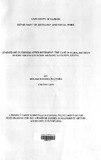| dc.description.abstract | The purpose of this study was to examine the psychological wellbeing of the retirees and its
association to successful aging. The target population was the older persons aged 60years
and above and have retired from employment in Kihumbu-ini location, Murang'a South
county.
The study sought to ascertain the social and demographic attributes of the respondents and
the main findings were guided by the specific objectives of the study which included the
following:
To find out the level to which they are satisfied with the lives after retirement; to find out the
challenges they are faced with; to analyze the coping mechanism utilized by the elderly by
looking at their levels of satisfaction; and lastly to analyze the level to which they have learnt
to be helpless.
The study adopted a descriptive research study design. Purposive sampling technique was
used in selection of study respondents. One key informant was used to supplement the study
findings. The main method for collecting data was interview and questionnaires were used as
the main instrument. The raw data from the field was analyzed using statistical package for
Social Sciences (SPSS).
The study findings revealed that the majority (79%) of the retirees are male, and the highest
level of formal education attained by the rural old is that of primary, the mode of retirement
for the majority (65.4%) was mandatoW~Iid was not ready for retirement.
The study also revealed that majority of the respondents have retired gracefully, they have a
high level of satisfaction which means they have the adaptive skills to cope with the
challenges that face them and have not learned helplessness. However, the retirees in this
location are faced with three major socialproblems, first, is the lack of social security, the
government have failed to provide social welfare to the elderly and this makes their life very
difficult. Secondly, social isolation, the family members have gone to towns and as a result,
the elderly are left alone without family care. Thirdly, the elderly lack empowerment and self
development to ease the transition.
From the study findings the following recommendations were made: the government should
intervene and establish a framework to ensure that the elderly population which is increasing
is provided with adequate social welfare, for example the government should improve the
social welfare schemes to increase the number of elderly receiving the benefits; systems
should be put in place for the employers to ensure that the employees are prepared about
retirement to ease the transition and reduce the anxiety that come with retirement. Post
retirement counseling programs and vocational issues for self development should be
designed to improve transition, to retirement and enhance adjustment to life transition.
A great deal of light has been thrown on the life of the retirees which can be critically
evaluated for a sustained plan to meet and improve their general welfare. | en |

